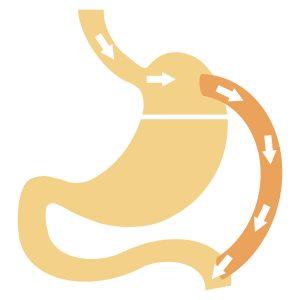Longstreet Clinic’s Center for Weight Management doctors have performed over 1,000 Roux-en-Y (RNY) gastric bypass surgeries since 2002 – with excellent results and a low complication rate.
Our RNY patients average 80 percent of excess body weight loss at 24 months post-surgery. And that is the stated aim of this invasive bariatric procedure.
Those patients who qualify for and undergo Gastric Bypass are in need of significant weight loss, and quite often in a timely manner in order to gain control of their health and avoid complications due to severe obesity.
What is Gastric Bypass and Who Needs it?
Gastric Bypass is an invasive weight loss surgery that can help provide significant and relatively quick weight loss results for those patients in need of results to kickstart their journey to better health.
The first Gastric Bypass was performed in 1959, and the procedure has gone through many updates thanks to modern medicine. The understanding of the body’s reaction to the procedure is also well-known. Thus, the Gastric Bypass is becoming a more popular operation in the bariatric surgical community.
Only those patients who measure at a Body Mass Index (BMI) of 40 or above qualify for bariatric surgery. A BMI of 30 or above is considered obese by the National Institute of Health. Some patients with a BMI of 35-39 may also qualify for the procedure if they are also suffering from complications resulting from obesity.
Obesity actually has its own medical designation, and it is recognized as a disease – not a lifestyle choice, despite what some may have you believe. The stigma of obesity causes both physical limitations and psychological damage.
Beyond that, however, it is the host of other problems that obesity can cause that makes it a dangerous disease. Called co-morbidities, they are many, including:
- Pulmonary Disease (includes abnormal function, sleep apnea, hypoventilation syndrome)
- Non-alcoholic Fatty Liver Disease (includes steatosis, steatohepatitis, cirrhosis)
- Gall Bladder Disease
- Gynecological abnormalities (includes abnormal menses, infertility, polycystic ovarian syndrome)
- Osteoarthritis
- Gout
- Phlebitis
- Cancer (includes breast, uterus, cervix, colon, esophagus, pancreas, kidney, prostate)
- Coronary Heart Disease (includes dyslipidemia, hypertension)
- Type 2 diabetes
- Cataracts
- Stroke
- Idiopathic Intracranial Hypertension
Curing obesity through surgical weight loss can lead to the reversal of or relief from a number of these health concerns. And studies show that consequential weight loss reduces these issues in many patients by a significant percentage.
Gastric Bypass is just one of several surgical weight loss options that Longstreet’s Center for Weight Management offers, and our expert staff will sit down with you in order to determine the option that best suits your body and lifestyle.
How Gastric Bypass Works
 In the Roux-en-Y Gastric Bypass (RNY), a golf ball-sized part of your stomach is surgically divided from the rest of the stomach, completely separating the two pieces in most cases. The now much smaller stomach severely restricts the amount of food you can take in, making you feel full much sooner than with your previous, regular-sized stomach. The procedure also changes your gut hormones, which will help you feel full longer. This appetite suppression is a key component of the weight loss that ensues post-operation.
In the Roux-en-Y Gastric Bypass (RNY), a golf ball-sized part of your stomach is surgically divided from the rest of the stomach, completely separating the two pieces in most cases. The now much smaller stomach severely restricts the amount of food you can take in, making you feel full much sooner than with your previous, regular-sized stomach. The procedure also changes your gut hormones, which will help you feel full longer. This appetite suppression is a key component of the weight loss that ensues post-operation.
The larger lower portion of the stomach never holds food again but does help with digestion.
During surgery, a branch of a Y-shaped segment of your small bowel is attached to the new, small stomach. The other branch of the bowel remains attached to the “original” stomach. This delays the mixing of food with digestive juices resulting in poorer absorption of calories and nutrients.
As a result, if you eat carbohydrates, including sugar, after gastric bypass surgery, the passage of “carbs” into your small intestine causes an immediate outpouring of fluid into the bowel and a release of insulin into the blood stream. This causes nausea, cramping and diarrhea for about 20 to 30 minutes. Called “dumping syndrome,” this unpleasant side effect can help prevent you from wrong foods for the rest of your life.
The Gastric Bypass features low complication rates, and our physicians always put your health and success first. That said, it should still be considered a major surgery, even if it is accomplished through several small incisions.
Patients who have undergone the surgery can expect a relatively quick recovery – in fact our doctors like to see patients moving around within the same day of surgery to help promote recovery and prevent any complications.
Rebecca’s Gastric Bypass Testimonial
Read more about Rebecca’s weight loss journey.
Advantages of Gastric Bypass
Compared to other weight loss surgeries, gastric bypass offers:
- Greater overall weight loss due to the tighter dietary restrictions and less caloric absorption
- Faster initial weight loss
- Your body helps direct healthier food choices because of strong discomfort caused by eating sugars, fats and carbs
- 96% of health problems related to obesity are completely resolved or reversed quickly
Disadvantages of Gastric Bypass
- Permanent change in your anatomy
- Restricts dietary choice for the rest of your life
- Dumping syndrome from eating foods high in sugar, calories and fat causes discomfort, 20-30 minutes of nausea, and possibly vomiting, diarrhea, and overall weakness each time
Permanent Changes
With Gastric Bypass surgery, your body forces you to conform to the same behaviors found in any sensible diet program: eat three meals a day, eat small portions, eat slowly, avoid high calorie foods, and when you’re full, stop eating.
The difference is that, unlike other methods of weight loss, you must be emotionally prepared to stay on these healthy, strict food choices for the rest of your life.
You must also adhere to a strict intake of vitamins and supplements in order to make up for some of the malabsorption that occurs by bypassing a significant portion of your digestive tract. Constant water intake is also a must to help process the nutrients and vitamins.
Beyond that, however, is the mental and psychological changes Gastric Bypass patients must make. No bariatric surgery should be viewed as a “quick fix,” and that is certainly true of Gastric Bypass. In fact, the procedure is a method to kickstart rapid weight loss for those patients in desperate need of a change in order to regain control of their health.
In the first few weeks following the procedure, patients are only be able to ingest small amounts of soft food and drink – sometimes measured as small as tablespoons – before eventually adding solid foods back into their diet.
To maintain the weight loss that patients begin to experience directly following, and in the years post-operation, they must continue to adhere to strict guidelines. With that in mind, the Center for Weight Management is there to support you each step of the way. Our board-certified staff will provide you with concrete nutritional guidelines and will educate you on everything you can expect following the changes you have undertaken.
To that end, Longstreet also hosts patient support groups – a key for many who experience the highs and lows of bariatric surgery, which can provide tremendous success but requires a winning mindset and a willingness to listen in order to sustain success.
Results from Gastric Bypass
Nationwide statistics show that 80 percent of gastric bypass patients lose at least half of their excess body weight and maintain that loss for more than five years. The average weight loss equaled 80 percent of excess body weight.
This also means that 2 out of every 10 gastric bypass patients failed to lose weight, or they lost it and gained it back within five years. That yo-yo response is typical in all forms of dieting and the approach to better health – surgical weight loss is no different and requires a commitment from the patient.
Because of very quick weight loss within the first few days and weeks of surgery, more than 96 percent of health problems related to morbid obesity are completely resolved and reversed during that time.
One of the biggest results that many patients report is their change in psychology. No longer do they spend their days obsessing about food and what they will have for their next meal(s). This frees up an amazing amount of time for other pursuits. This can also be quite jarring for patients initially, but those who embrace the changes find themselves in a much happier position.
That is certainly the case when they begin to experience the physical improvements that come from significant weight loss. Beyond the reduction of co-morbidities, simple things such as improved stamina, better flexibility and the ability to take part in more family activities are a major factor in the continued success of bariatric surgery patients.
Your road to success starts with the determination to get control of your health, and we’re here to help you start that journey today.
Additional Gastric Bypass resources:
Life After Gastric Bypass Surgery
Lifetime Commitment & Dietary Changes
Risks of Gastric Bypass Surgery
Have questions? Watch our online seminar, then fill out our contact form and our office team will reach out to you. Or please call our main office at 770-534-0110 or toll-free at 877-921-0110.
Ready to get started? Fill out our Weight Loss Surgery history form.

